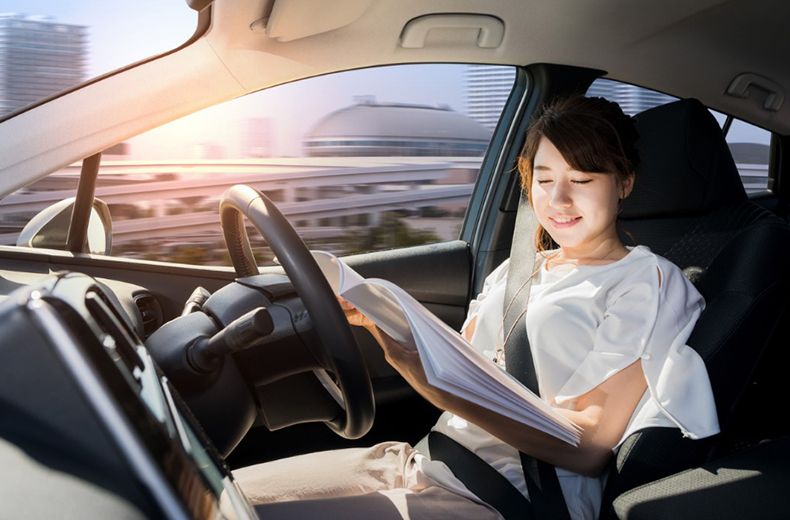As the motoring world moves towards self-driving cars, how much do you know about these vehicles? And when can you expect to see them on the UK’s roads?
We decided to answer some of the most searched-for queries about driverless cars to help keep you in the know in this latest feature.
How do driverless cars work?
A combination of radar sensors, video cameras, lidar sensors (a type of laser), and ultrasonic sensors constantly scan the conditions around the car, picking up everything from kerbs and road markings, to pedestrians and traffic lights.
Data from these systems is then analysed by the vehicle’s central computer, powering the car and allowing it to respond accordingly to the varying conditions and obstacles on the road.
That's the very short, very simplified explanation anyway. It turns out that you need a lot of very advanced systems all working together to mimic what your brain does behind the wheel.
When will driverless cars be available?
Despite what you might think, driverless technology is already on our roads.
Features like automatic emergency braking, adaptive cruise control and lane-keeping assistance are all classified as Level Two automations, where the car takes control of certain aspects but the driver remains in control at all times.
In total, there are five levels of automation, although currently only those up to Level Two are legally allowed on the UK’s roads. For more information on these levels, read our complete guide to driverless vehicles.
Why do we need driverless cars?
The popularity of this question shows that a lot of us still need convincing to give up driving our beloved cars; and it's a hard one to answer because self-driving vehicles haven't been around for long enough for us to see any of the oft-cited advantages to their adoption.
With that being said, there are some arguments that frequently come up in the driverless cars debate to support them:
- Safer streets: Driverless cars could see fewer accidents as most accidents today cite human error as the main or major contributary factor (speeding, tiredness, etc.)
- More efficient mobility: Cars will be able to communicate with each other to avoid jams. If these connected cars can spread themselves amongst less-congested areas to alleviate the traffic on popular roads at peak times, congestion may become a thing of the past
- Improved air quality: Less congestion should mean fewer emissions and pollutants are entering the atmosphere
- Improved accessibility: Driverless cars will provide transport options for those who would otherwise be unable, particularly in rural areas where public transport is infrequent or not available
- Less private ownership: Car sharing could see you call for a vehicle whenever you need it, meaning you save money on owning one. Instead, we might all be using Cars as a Service (CaaS) to subscribe to a fleet of autonomous vehicles that we call out only when we need one

Cheaper than AA or we'll beat by 20%^
• Roadside cover from £5.49 a month*
• We get to most breakdowns in 60 mins or less
• Our patrols fix 4/5 breakdowns on the spot

When will driverless cars be in the UK?
Currently, only Level Two vehicles are legally allowed on the UK’s roads, which means drivers are still required to remain in control at all times.
However, the UK government is currently supporting the ongoing development of driverless technology.
When will driverless cars be common?
The UK government has set a target for self-driving vehicles to be operational on roads in the UK by 2026, following the enactment of the Automated Vehicles Act in May 2024.
- Electric cars – the ultimate guide
- Top 10 safety features modern cars should have as standard
- Connected cars – everything you need to know
How much will driverless cars cost?
As with any new tech – like electric vehicles and hybrids – the cars will always be more expensive when they first hit the market, so you might be paying out a fair bit more for the latest driverless models.
5 Star Defaqto rated cover
RAC Comprehensive Car Insurance Plus has been given a 5 Star Rating by Defaqto. Get a quote online today.


Who invented the self-driving car?
Some will say Norman Bel Geddes, who depicted radio-controlled cars at the 1939 World’s Fair, while others might mention William Bertelsen, who invented a self-driving hover car back in 1961.
However, it wasn’t really until 1986 that the first modern self-driving car appeared – a vision-guided Mercedes-Benz robotic van designed by Ernst Dickmanns that could reach speeds of 39 mph on the road.
How many jobs will be lost to driverless cars?
With the rise of autonomous vehicles, some have voiced concerns over the impact of driverless tech on jobs, but what is the reality?
Although the industry will likely evolve with the technology - and need people to still manage the process - it’s important to note that with driverless tech still some way off being legally allowed on the roads, don’t expect any potential job losses to happen overnight.
Are driverless cars legal?
In short, no, not yet. Currently, only Level Two vehicles – those with autonomous features like parking assist and adaptive cruise control – are legal.
It remains to be seen when fully driverless cars will be legally allowed on roads in the UK (or anywhere else, for that matter), although with technology improving rapidly they might appear sooner than you think.
Are driverless cars safe?

It’s a simple fact that most car accidents are caused by human error – be it speeding, tiredness, or simple driving mistakes – and advocates of autonomous tech claim driverless cars will be safer than the cars we know today.
That’s because self-driving cars will follow set rules that are programmed into them, whereas human drivers are unpredictable.
However, while this may work around other driverless cars, it’s argued that this could cause problems when self-driving cars come into contact with humans – namely cyclists, pedestrians and other, non-driverless vehicles.
That’s why engineers and developers around the world have already spent thousands of hours road testing all manner of autonomous tech to ensure self-driving cars are as safe as they can be before they hit the roads.
- Are electric cars actually worse for the environment?
- How to use cruise control
- 10 driving habits that are secretly damaging your car
Are driverless cars ethical?
Human drivers make decisions based on their ethics all the time – from letting a pedestrian illegally cross the street, to avoiding a runaway dog – but would a self-driving car be able to make the same split-second decisions?
The ethics of driverless cars have made headlines in recent years, including concerns over facial recognition technologies with regard to pedestrians and it’s clear that more needs to be done to reassure the public.
However, as technology advances it’s likely these issues will be addressed to ensure the safety and security of all road users.
Are driverless cars the future?
Probably. While the shift towards a fully driverless world may not be coming as quickly as some commentators have previously claimed, there’s no doubt that we are moving through the gears towards an autonomous future.
Just how long we have to wait for a fully driverless road network remains to be seen, but with technology ever-advancing we could be closer than we realise.
Can you get driverless car insurance?
Not yet, but the autonomous revolution has raised questions for insurers about how they would deal with liability in collisions involving driverless vehicles.
Here in the UK, the government is currently working on a new regulatory framework to be in place by the time driverless cars hit the road. This would give insurers greater clarity on what they can expect.






